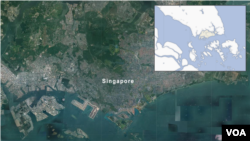Chan Man Ping Philip, a 59-year-old Hong Kong-born businessman with strong connections to China, stands in a category of one.
As of this week, he is the first and only person designated as a “politically significant person” under Singapore’s foreign interference laws, which places unique reporting requirements on influential individuals deemed to be susceptible to foreign pressure.
Chan, who is heavily involved in Singapore’s property sector, must now annually disclose any political donations that he receives worth more than 10,000 Singapore dollars – about $7,440 – as well as any foreign affiliations and migration benefits. He can appeal the decision.
In announcing the move Monday, the Home Affairs Ministry described Chan’s activities as “directed towards a political end in Singapore.” It also described him as having “shown susceptibility to be influenced by foreign actors, and willingness to advance their interests.”
In December 2023, provisions relating to “politically significant persons” were added to Singapore's Foreign Interference (Countermeasures) Act. The law applies the designation not only to officeholders and the like, but also to others whose activities are directed toward political ends.
Singapore did not identify any country whose interests Chan is accused of promoting, but analysts and the media have looked at the 59-year-old's past comments, activities and interactions as clues.
Chan, a naturalized Singapore citizen, is a former president of the Hong Kong Singapore Business Association. Local media have reported that he was also invited to Beijing last year to attend the Two Sessions parliamentary meetings, China’s most significant annual political gathering. He was one of 30 "overseas Chinese representatives” invited by the Chinese People's Political Consultative Conference.
The Straits Times reported that Chan spoke with Chinese media last March, saying: “it is our duty as overseas Chinese to tell China’s story well, and to spread and pass on the marvelous traditional Chinese culture while we are abroad.”
“Attending these (CPPCC) meetings would have got authorities interested, but that in itself is not an issue, it's more the way he went about making comments about the need to support China," Benjamin Ho, Assistant Professor and Coordinator of China Programme at the S. Rajaratnam School of International Studies told VOA.
Chan is the founder of China Link Education Consultancy, which offers study programs to “nurture better understanding and more appreciation toward China.”
While the ministry said its decision was “in the public interest,” no specific details regarding Chan’s activities have been released.
"Telling the China story is not uncommon, many people do it, but depending on who you are, some views are more important and more influential than others," said Ho.
The ministry said the law is needed to counter foreign interference in domestic politics, claiming that the city-state is “especially vulnerable to the evolving threat.”
“This [law] is not unique to Singapore, other countries also have anti-foreign interference laws,” said Ben Chester Cheong, a lecturer of law at Singapore University of Social Sciences
“It may not be as widely publicized, but they also achieve the same outcome. National security threats are real and a serious problem to any country,” he told VOA.
Critics of the law point to its broad scope and concerns that it could be used to silence dissent. Amnesty International described it as a “brutal attack on the rights to freedom of expression and association.”
Being designated as a politically sensitive person “does not make such a person a criminal,” Eugene Tan, an associate professor of law at Singapore’s Management University, told VOA. “He can still go about his trade, profession, and other social activities as he did before although he would have to comply with the countermeasures imposed on him.
“But as a designated PSP, this will put other people on notice that such a person may well be acting on the behest of a foreign entity,” he added.
Chan refused a VOA interview request but told local media that he will “deal with the authorities directly” and has “full trust and faith in the Singapore government.”
His China ties have previously attracted Singaporean authorities’ attention.
In 2019, The Straits Times reported that Chan was warned by police after he facilitated a gathering at a restaurant he owned to discuss anti-government protests in Hong Kong, where people chanted, "support Hong Kong police, protect Hong Kong, justice will win."
Such meetings are heavily restricted in Singapore and the organizer of the event, a Hong Kong restaurateur, was sent back home.
Chan also serves as president of the Kowloon Club, an organization that helps new immigrants to settle into Singapore life, with the majority coming from Hong Kong. The club did not respond to a request for comment.
Chan, who moved to Singapore from Hong Kong in 1990, has long been involved in the Southeast Asian nation’s property sector.
He is currently managing director of Wen Way investments and chief executive at C&H Properties. He also founded Mutual Benefits Realty, which serves wealthy Chinese looking to invest in Singapore property.
The Chinese Embassy in Singapore did not respond to VOA’s request for comment on Singapore’s decision to target Chan under foreign interference laws. The two countries share close ties and pledged to further cooperate last August.
“I do not think this will have any long-lasting effect with regard to Singapore's ties with Beijing. They are still very strong, deep and dynamic,” said Dylan Loh, an assistant professor and Chinese foreign policy expert at Nanyang Technological University.
“The muted response from China is quite telling, as is the fact that officially, Singapore has not directly named China,” Loh told VOA.
